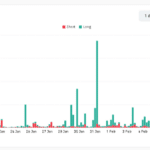Commentary by Joe Mysak
Nov. 28 (Bloomberg) -- Swaps live.
Yes, states and localities across the nation are paying millions of dollars to get out of the interest-rate swaps and other derivatives that they engaged in during the past decade.
Yes, Jefferson County, Alabama, has been toying with the idea of bankruptcy, its finances in ruins because of an infatuation with variable-rate debt and interest-rate swaps.
Yes, the federal government is looking into the whole reinvestment-of-bond-proceeds business, which includes guaranteed investment contracts, swaps and derivatives. “Looking into” is probably too mild a term for the high- profile investigation.
And yes, JPMorgan Chase & Co., once one of the biggest purveyors of swaps and derivatives in public finance, said on Sept. 3 that it was getting out of the business. It seems the risks of selling these things to local governments are greater than the rewards.
Well, I have news for you. Don’t bury swaps. They’re not dead yet.
What? Is this possible?
There are still some municipalities getting involved in swaps and derivatives, judging from rating-company reports. Most seem to be planning or executing exit strategies. Some are deciding what to do about contracts they entered into years ago. Still, that any municipalities are even contemplating their use, at all, is amazing and appalling.
Big Secret
Can’t you folks just say no?
I’m sure your bankers are coming in and saying, “Hey, you know what, we can put together a transaction that makes a lot of economic sense right now.”
And there are probably some financial advisers who are even saying how much money you can make today by selling an option for a swap to be entered into at some point in the future.
Does the experience of the last nine months or a year mean nothing? Doesn’t it at least give you pause? Shouldn’t you get in touch and talk it over with some of your fellow government finance officers, who have had to unwind their nightmarish involvement in the swaps and derivatives market?
Terminating their runaway swaps is costing cities, towns and school districts millions of dollars right now. Many of the public officials involved are ashamed and are trying to keep a lid on it all, I realize, especially because everything about the swaps market is supposed to be a big secret. Surely some of them will talk about it, especially the ones filing lawsuits.
State Law
I like to read new-issue ratings reports (it’s an acquired taste) from the companies that grade municipal bonds.
I was especially taken with what Moody’s Investors Service said in its analysis of a Pennsylvania school district’s rating earlier this month.
This particular district was refinancing some debt and retaining two interest-rate swaps with Royal Bank of Canada.
In 2003, the state of Pennsylvania gave its municipalities the power to use swaps as long as they hired an independent financial adviser to help them figure out the deals. A 2008 story in Bloomberg Markets magazine showed that this was like letting the fox loose in the henhouse.
It seems that most of the school districts that were examined paid far too much for their swaps.
Common Tools
That’s easy if you don’t really know what you are doing, and most municipalities don’t, when it comes to these kinds of transactions. The story’s conclusions were so alarming that I suggested the state prepare a comprehensive study detailing just how the state’s school districts have fared with their use of swaps and derivatives since passage of the 2003 law.
Not very well, I suspect. Moody’s nevertheless said in its rating report that it “expects these tools to become common for Pennsylvania school districts for asset and liability management,” adding that there was “little state supervision” of their use.
Moody’s continued: “The use of swaps will require credit monitoring given the increasingly complex nature of these instruments. Moody’s will also continue to base its analysis on the amount of exposure and our assessment of district management’s understanding of the complexities and additional risks involved in swaps.”
That’s nice. Moody’s thinks school districts’ use of swaps will become “common.”
This is too funny to be a tragedy, too sad to be a farce
Friday, November 28, 2008
Subscribe to:
Post Comments (Atom)



No comments:
Post a Comment